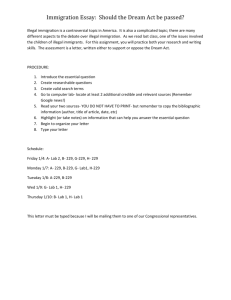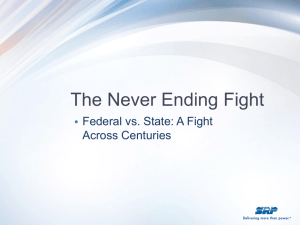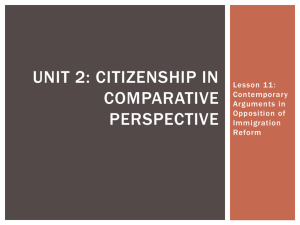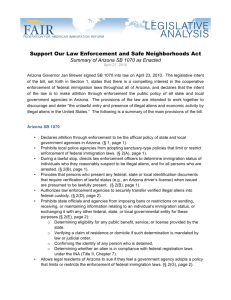Arizona Immigration Law (Arizona SB1070) Summary
advertisement
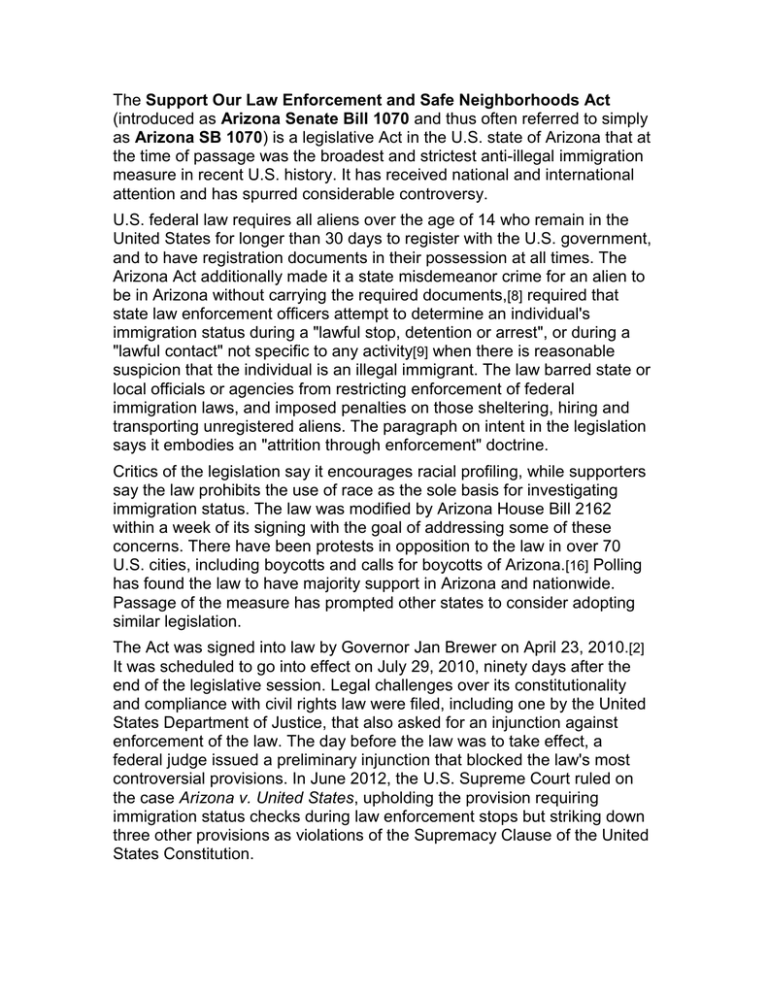
The Support Our Law Enforcement and Safe Neighborhoods Act (introduced as Arizona Senate Bill 1070 and thus often referred to simply as Arizona SB 1070) is a legislative Act in the U.S. state of Arizona that at the time of passage was the broadest and strictest anti-illegal immigration measure in recent U.S. history. It has received national and international attention and has spurred considerable controversy. U.S. federal law requires all aliens over the age of 14 who remain in the United States for longer than 30 days to register with the U.S. government, and to have registration documents in their possession at all times. The Arizona Act additionally made it a state misdemeanor crime for an alien to be in Arizona without carrying the required documents,[8] required that state law enforcement officers attempt to determine an individual's immigration status during a "lawful stop, detention or arrest", or during a "lawful contact" not specific to any activity[9] when there is reasonable suspicion that the individual is an illegal immigrant. The law barred state or local officials or agencies from restricting enforcement of federal immigration laws, and imposed penalties on those sheltering, hiring and transporting unregistered aliens. The paragraph on intent in the legislation says it embodies an "attrition through enforcement" doctrine. Critics of the legislation say it encourages racial profiling, while supporters say the law prohibits the use of race as the sole basis for investigating immigration status. The law was modified by Arizona House Bill 2162 within a week of its signing with the goal of addressing some of these concerns. There have been protests in opposition to the law in over 70 U.S. cities, including boycotts and calls for boycotts of Arizona.[16] Polling has found the law to have majority support in Arizona and nationwide. Passage of the measure has prompted other states to consider adopting similar legislation. The Act was signed into law by Governor Jan Brewer on April 23, 2010.[2] It was scheduled to go into effect on July 29, 2010, ninety days after the end of the legislative session. Legal challenges over its constitutionality and compliance with civil rights law were filed, including one by the United States Department of Justice, that also asked for an injunction against enforcement of the law. The day before the law was to take effect, a federal judge issued a preliminary injunction that blocked the law's most controversial provisions. In June 2012, the U.S. Supreme Court ruled on the case Arizona v. United States, upholding the provision requiring immigration status checks during law enforcement stops but striking down three other provisions as violations of the Supremacy Clause of the United States Constitution. Provisions U.S. federal law requires aliens 14 years old or older who are in the country for longer than 30 days to register with the U.S. government and have registration documents in their possession at all times. The Act makes it a state misdemeanor crime for an alien to be in Arizona without carrying the required documents and obligates police to make an attempt, when practicable during a "lawful stop, detention or arrest", to determine a person's immigration status if there is reasonable suspicion that the person is an illegal alien. Any person arrested cannot be released without confirmation of the person's legal immigration status by the federal government pursuant to § 1373(c) of Title 8 of the United States Code. A first offense carries a fine of up to $100, plus court costs, and up to 20 days in jail; subsequent offenses can result in up to 30 days in jail (SB 1070 required a minimum fine of $500 for a first violation, and for a second violation a minimum $1,000 fine and a maximum jail sentence of 6 months). A person is "presumed to not be an alien who is unlawfully present in the United States" if he or she presents any of the following four forms of identification: a valid Arizona driver license; a valid Arizona nonoperating identification license; a valid tribal enrollment card or other tribal identification; or any valid federal, state, or local government-issued identification, if the issuer requires proof of legal presence in the United States as a condition of issuance. The Act also prohibits state, county, and local officials from limiting or restricting "the enforcement of federal immigration laws to less than the full extent permitted by federal law" and provides that any legal Arizona resident can sue the agencies or officials in question to compel such full enforcement. If the person who brings suit prevails, that person may be entitled to reimbursement of court costs and reasonable attorney fees.[9] In addition, the Act makes it a crime for anyone, regardless of citizenship or immigration status, to hire or to be hired from a vehicle which "blocks or impedes the normal movement of traffic." Vehicles used in such manner are subject to mandatory immobilization or impoundment. Moreover, for a person in violation of a criminal law, it is an additional offense to transport an alien "in furtherance" of the alien's unauthorized presence in the U.S., to "conceal, harbor or shield" an alien, or to encourage or induce an alien to immigrate to the state, if the person "knows or recklessly disregards the fact" that the alien is in the U.S. without authorization or that immigration would be illegal. Violation is a class 1 misdemeanor if fewer than ten unauthorized aliens are involved, and a class 6 felony if ten or more are involved. The offender is subject to a fine of at least $1,000 for each authorized alien involved. The transportation provision includes exceptions for child protective services workers, and ambulance attendants and emergency medical technicians. Background and passage Arizona is the first state to enact such far-reaching legislation. Prior law in Arizona, like the law in most other states, does not mandate that law enforcement personnel ask about the immigration status of those they encounter. Many police departments discourage such inquiries to avoid deterring immigrants from reporting crimes and cooperating in other investigations. Impetus for SB 1070 is attributed to shifting demographics leading to a larger Hispanic population, increased drugs- and human smuggling-related violence in Mexico and Arizona, and a struggling state economy and economic anxiety during the late-2000s recession. State residents were also frustrated by the lack of federal progress on immigration, which they viewed as even more disappointing given that Napolitano was in the administration. Reaction Opinion polls A Rasmussen Reports poll done nationally around the time of the signing indicated that 60 percent of Americans were in favor of and 31 percent opposed to legislation that allows local police to "stop and verify the immigration status of anyone they suspect of being an illegal immigrant." The same poll also indicated that 58 percent are at least somewhat concerned that "efforts to identify and deport illegal immigrants will also end up violating the civil rights of some U.S. citizens." A national Gallup Poll found that more than three-quarters of Americans had heard about the law, and of those who had, 51 percent were in favor of it against 39 percent opposed. An Angus Reid Public Opinion poll indicated that 71 percent of Americans said they supported the notion of requiring their own police to determine people's status if there was "reasonable suspicion" the people were illegal immigrants, and arresting those people if they could not prove they were legally in the United States. A nationwide New York Times/CBS News poll found similar results to the others, with 51 percent of respondents saying the Arizona law was "about right" in its approach to the problem of illegal immigration, 36 percent saying it went too far, and 9 percent saying it did not go far enough. Another CBS News poll, conducted a month after the signing, showed 52 percent seeing the law as about right, 28 percent thinking it goes too far, and 17 percent thinking it does not go far enough. A 57 percent majority thought that the federal government should be responsible for determining immigration law. A national Fox News poll found that 61 percent of respondents thought Arizona was right to take action itself rather than wait for federal action, and 64 percent thought the Obama administration should wait and see how the law works in practice rather than trying to stop it right away.[63] Experts caution that in general, polling has difficulty reflecting complex immigration issues and law. Another Rasmussen poll, done statewide after several days of heavy news coverage about the controversial law and its signing, found a large majority of Arizonans still supported it, by a 64 percent to 30 percent margin. Rasmussen also found that Brewer's approval ratings as governor had shot up, going from 40 percent of likely voters before the signing to 56 percent after, and that her margin over prospective Democratic gubernatorial opponent, State Attorney General Terry Goddard (who opposes the law) had widened.[64] A poll done by Arizona State University researchers found that 81 percent of registered Latino voters in the state opposed SB 1070. Public officials United States In the United States, supporters and opponents of the bill have roughly followed party lines, with most Democrats opposing the bill and most Republicans supporting it. The bill was criticized by President Barack Obama who called it "misguided" and said it would "undermine basic notions of fairness that we cherish as Americans, as well as the trust between police and our communities that is so crucial to keeping us safe." Obama did later note that the HB 2162 modification had stipulated that the law not be applied in a discriminatory fashion, but the president said there was still the possibility of suspected illegal immigrants "being harassed and arrested". He repeatedly called for federal immigration reform legislation to forestall such actions among the states and as the only long-term solution to the problem of illegal immigration. Governor Brewer and President Obama met at the White House in early June 2010 to discuss immigration and border security issues in the wake of SB 1070; the meeting was termed pleasant, but brought about little change in the participants' stances. Secretary of Homeland Security and former Arizona governor Janet Napolitano testified before the Senate Judiciary Committee that she had "deep concerns" about the law and that it would divert necessary law enforcement resources from combating violent criminals. (As governor, Napolitano had consistently vetoed similar legislation throughout her term.) U.S. Attorney General Eric Holder said the federal government was considering several options, including a court challenge based on the law leading to possible civil rights violations. Michael Posner, the Assistant Secretary of State for Democracy, Human Rights, and Labor, brought up the law in discussions with a Chinese delegation to illustrate human rights areas the U.S. needed to improve on. This led McCain and fellow senator from Arizona Jon Kyl to strongly object to any possibly implied comparison of the law to human rights abuses in China. Senior Democratic U.S. Senator Chuck Schumer of New York and Mayor of New York City Michael Bloomberg have criticized the law, with Bloomberg stating that it sends exactly the wrong message to international companies and travelers. In testimony before the Senate Homeland Security Committee, McCain drew out that Napolitano had made her remarks before having actually read the law. Holder also acknowledged that he had not read the statute. The admissions by the two cabinet secretaries that they had not yet read SB 1070 became an enduring criticism of the reaction against the law. Former Alaska governor and vice-presidential candidate Sarah Palin accused the party in power of being willing to "criticize bills (and divide the country with ensuing rhetoric) without actually reading them." Governor Brewer's election campaign issued a video featuring a frog hand puppet that sang "reading helps you know what you're talkin' 'bout" and urged viewers to fully read the law. In reaction to the question, President Obama told a group of Republican senators that he had in fact read the law. Democrat Linda Sánchez, U.S. Representative from California's 39th congressional district, has claimed that white supremacy groups are in part to blame for the law's passage, saying, "There's a concerted effort behind promoting these kinds of laws on a state-by-state basis by people who have ties to white supremacy groups. It's been documented. It's not mainstream politics." Republican Representative Gary Miller, from California's 42nd congressional district, called her remarks "an outrageous accusation [and a] red herring. [She's] trying to change the debate from what the law says." Sánchez' district is in Los Angeles County and Miller's district is in both Los Angeles County and neighboring Orange County. The law has been popular among the Republican Party base electorate; however, several Republicans have opposed aspects of the measure, mostly from those who have represented heavily Hispanic states. These include former Governor of Florida Jeb Bush,[79] former Speaker of the Florida House of Representatives and campaigning U.S. Senate candidate Marco Rubio, and former George W. Bush chief political strategist Karl Rove. Some analysts have stated that Republican support for the law gives short-term political benefits by energizing their base and independents, but longer term carries the potential of alienating the growing Hispanic population from the party. The issue played a role in several Republican primary contests during the 2010 congressional election season. One Arizona Democrat who defended some of the motivation behind the bill was Congresswoman Gabrielle Giffords, who said her constituents were "sick and tired" of the federal government failing to protect the border, that the current situation was "completely unacceptable", and that the legislation was a "clear calling that the federal government needs to do a better job". However, she stopped short of supporting the law itself, saying it "does nothing to secure our border" and that it "stands in direct contradiction to our past and, as a result, threatens our future."[83] Her opposition to the law became one of the issues in her 2010 re-election campaign, in which she narrowly prevailed over her Republican opponent, who supported it. U.S. Secretary of State Hillary Rodham Clinton included the dispute over SB 1070 in an August 2010 report to the Office of the United Nations High Commissioner for Human Rights, as an example to other countries of how fractious issues can be resolved under the rule of law.[86] Governor Brewer demanded that the reference to the law be removed from the report, seeing its inclusion as implying that the law was a violation of human rights[87] and saying that any notion of submitting U.S. laws to U.N. review was "internationalism run amok".

